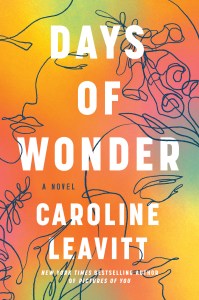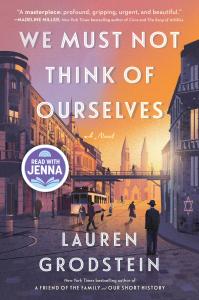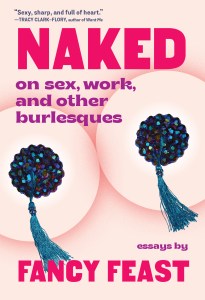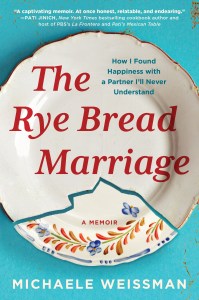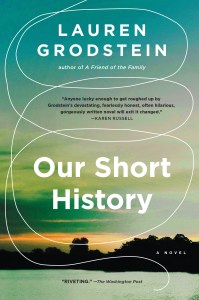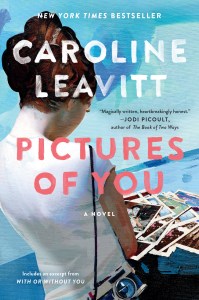Algonquin Jewish Heritage Month
Algonquin Jewish Heritage Month
Join us in celebrating Jewish Heritage Month by picking up a copy of one of these fantastic reads.
As a teenager, for a moment, Ella Fitchburg found love—yearning, breathless love—that consumed both her and her boyfriend, Jude, as they wandered the streets of New York City together. But her glorious life was pulled out from beneath her after she was accused of trying to murder Jude’s father, an imperious superior court judge. When she learns she’s pregnant shortly after receiving a long prison sentence, she reluctantly decides to give up the child.
Ella is released from prison after serving only six years and is desperate to turn the page on a new life, but she can’t seem to let go of her past. With only an address as a possible lead, she moves to Ann Arbor, Michigan, determined to get her daughter back. Hiding her identity and living in a constant state of deception, she finds that what she’s been searching for all along is a way to uncover—and live with—the truth. Yet a central mystery endures: neither Jude nor Ella can remember the events leading up to the attempted murder—that fateful night which led to Ella’s conviction.
For fans of Miranda Cowley Heller’s The Paper Palace and Allegra Goodman’s Sam, Caroline Leavitt’s Days of Wonder is a gripping high-drama page-turner about the elusive nature of redemption and the profound reach of love.
On a November day in 1940, Adam Paskow becomes a prisoner in the Warsaw Ghetto, where the Jews of the city are cut off from their former lives and held captive by Nazi guards to await an uncertain fate. Weeks later, he is approached by a mysterious figure with a surprising request: Would he join a secret group of archivists working to preserve the truth of what is happening inside these walls?
Adam agrees and begins taking testimonies from his students, friends, and neighbors. One of the people Adam interviews is his flatmate Sala Wiskoff, who is stoic, determined, and funny—and married with two children. Over the months of their confinement, in the presence of her family, they fall in love. But when Adam discovers a possible escape from the Ghetto, he is faced with an unbearable choice: whom can he save, and at what cost ?
Inspired by the testimony-gathering project with the code name Oneg Shabbat, and told with immediacy and heart, We Must Not Think of Ourselves is a piercing story of love, determination, and sacrifice.
Fancy Feast draws back the curtain to reveal a world that most denizens of the daytime never see. Part exclusive backstage pass, part long-form literary striptease, these essays confront our culture’s tightly held beliefs—like so many clutched pearls—about sex, communication, power, and the messiness of life on the margins of respectability. In “Dildo Lady,” Fancy recounts her time compensating for the failures of the American sex education system while working retail at a sex toy store. In “Doing Yourself,” Fancy tackles fatphobia and dating, self-love, and fantasies. In “Yes/No/Maybe,” Fancy brings the reader from sex parties to polyamorous relationships as she contrasts the undeniable sexiness of enthusiastic consent with the devastating effects of miscommunication and entitlement.
Fancy Feast does this all as a fat woman who makes a living taking off her clothes—a triumphant punch-back at a culture that wants fat people to be self-hating or sexless. For fans of Lindy West and Melissa Febos, Naked is by turns splashy, vulnerable, and always powerful.
When they first meet, John— a dashing European, a Latvian refugee, a physics PhD—is hoping to settle down. Michaele, a fast-talking American college student, is hungry for an independent life as a writer and historian. “I am too young, and you are too Latvian,” the twenty-year-old Michaele tells the twenty-eight-year-old John, explaining why she is ending their four-month romance.
Fifteen years later, the two are married. Their love for each other does not assuage the trauma John experienced as a child during World War II; nor does it help Michaele understand her husband’s unwavering devotion to every aspect of Latvian culture, particularly his passion for the dark, intense rye bread of his birthplace (nothing like the rye she knew growing up in her secular Jewish household).
Michaele feels like an outsider in her own relationship, unable to touch a core piece of her husband’s being. So, as John realizes his dream of opening a rye bread bakery, Michaele embarks on a fascinating journey. Delving into history and traveling across Europe with John, she excavates poignant stories of war, privation, and resilience—and realizes at last that rye bread represents everything about John’s homeland that he loved and lost. Eventually Michaele even comes to love rye bread, too.
How do the stories we live and the stories we inherit play out in our relationships? How do individuals learn to tolerate ethnic, religious, and national differences? The Rye Bread Marriage is a beautifully told, often humorous, love story about the messiness of spending a lifetime with another human being. Michaele Weissman reminds us that every relationship is a mystery—and a miracle.
“A marvelous yarn, loaded with near-calamitous adventures and characters as memorable as Singer creations.” —The New York Post
“What began as a quixotic journey was also a picaresque romp, a detective story, a profound history lesson, and a poignant evocation of a bygone world.” —The Boston Globe
“Every now and again a book with near-universal appeal comes along: Outwitting History is just such a book.” —The Sunday Oregonian
As a twenty-three-year-old graduate student, Aaron Lansky set out to save the world’s abandoned Yiddish books before it was too late. Today, more than a million books later, he has accomplished what has been called “the greatest cultural rescue effort in Jewish history.” In Outwitting History, Lansky shares his adventures as well as the poignant and often laugh-out-loud stories he heard as he traveled the country collecting books. Introducing us to a dazzling array of writers, he shows us how an almost-lost culture is the bridge between the old world and the future—and how the written word can unite everyone who believes in the power of great literature.
A Library Journal Best Book
A Massachusetts Book Award Winner in Nonfiction
An ALA Notable Book
Leavitt’s new novel, Days of Wonder, is coming April 23, 2024. Pre-order now!
In 1956, Ava Lark rents a house with her twelve-year-old son, Lewis, in a desirable Boston suburb. Ava is beautiful, divorced, Jewish, and a working mom. She finds her neighbors less than welcoming. Lewis yearns for his absent father, befriending the only other fatherless kids: Jimmy and Rose. One afternoon, Jimmy goes missing. The neighborhood—in the throes of Cold War paranoia—seizes the opportunity to further ostracize Ava and her son.
Years later, when Lewis and Rose reunite to untangle the final pieces of the tragic puzzle, they must decide: Should you tell the truth even if it hurts those you love, or should some secrets remain buried?
“[A] highly entertaining literary thriller about fine art and foolish choices.” —Parade
“[A] nimble mystery.” —The New York Times Book Review
“Gripping.” —O, The Oprah Magazine
Almost twenty-five years after the infamous art heist at the Isabella Stewart Gardner Museum—still the largest unsolved art theft in history—one of the stolen Degas paintings is delivered to the Boston studio of a young artist. Claire Roth has entered into a Faustian bargain with a powerful gallery owner by agreeing to forge the Degas in exchange for a one-woman show in his renowned gallery. But as she begins her work, she starts to suspect that this long-missing masterpiece—the very one that had been hanging at the Gardner for one hundred years—may itself be a forgery. The Art Forger is a thrilling novel about seeing—and not seeing—the secrets that lie beneath the canvas.
In Girl Meets God, this appealingly honest young woman takes us through a year in her search for a religious identity. Despite her conversion, she finds that her world is still shaped by her Jewish experiences. Even as she rejoices in the holy days of the Christian calendar, she mourns the Jewish rituals she still holds dear. Attempting to reconcile the two sides of her religious self, Winner applies the lessons of Judaism to the teachings of the New Testament, hosts a Christian seder, and struggles to fit her Orthodox friends into her new religious life.
Ultimately she learns that faith takes practice and belief is an ongoing challenge. Like Anne Lamott’s, Winner’s journey to Christendom is bumpy, but it is the rocky path itself that makes her a perfect guide to exploring spirituality in today’s complicated world. Her engaging approach to religion in the twenty-first century is illuminating, thought-provoking, and most certainly controversial.
"A clever and complex tale of art fraud, theft, scandal, murder, and revenge.” —Publishers Weekly
In this surprising, noirish page-turner, B. A. Shapiro once again takes readers into the world of art, glamour, and mystery. Accused of helping her fiancé steal her family’s fortune and her father’s art collection, Paulien Mertens has fled to France. To protect herself from the law and the wrath of those who lost everything, she has created a new identity. Paulien, aka Vivienne, takes a position working for an American art collector modeled after real-life eccentric museum founder Albert Barnes and quickly becomes caught up in the 1920s Paris of artists and expats, including post-Impressionist painter Henri Matisse and writer Gertrude Stein. From there, she sets out to recover her father’s art collection, prove her innocence, and exact revenge on her ex-fiancé. B. A. Shapiro has made the historical art thriller her own, and once again she gives us an unforgettable tale about what we see—and what we refuse to see.
In 1920, in small-town America, the ubiquitous dry goods store–suits and coats, shoes and hats, work clothes and school clothes, yard goods and notions–was usually owned by Jews and often referred to as “the Jew store.” That’s how Stella Suberman’s father’s store, Bronson’s Low-Priced Store, in Concordia, Tennessee, was known locally. The Bronsons were the first Jews to ever live in that tiny town (1920 population: 5,318) of one main street, one bank, one drugstore, one picture show, one feed and seed, one hardware, one barber shop, one beauty parlor, one blacksmith, and many Christian churches. Aaron Bronson moved his family all the way from New York City to that remote corner of northwest Tennessee to prove himself a born salesman–and much more. Told by Aaron’s youngest child, The Jew Store is that rare thing–an intimate family story that sheds new light on a piece of American history. Here is One Man’s Family with a twist–a Jew, born into poverty in prerevolutionary Russia and orphaned from birth, finds his way to America, finds a trade, finds a wife, and sets out to find his fortune in a place where Jews are unwelcome. With a novelist’s sense of scene, suspense, and above all, characterization, Stella Suberman turns the clock back to a time when rural America was more peaceful but no less prejudiced, when educated liberals were suspect, and when the Klan was threatening to outsiders. In that setting, she brings to life her remarkable father, a man whose own brand of success proves that intelligence, empathy, liberality, and decency can build a home anywhere. The Jew Store is a heartwarming–even inspiring–story.
Pre-order author Lauren Grodstein’s new simply can’t-be-missed novel, We Must Not Think of Ourselves, coming November 28, 2023. A truly unforgettable story about the fight for life—and love—in the Warsaw Ghetto during World War II.
Pete Dizinoff, a skilled and successful New Jersey internist, has a loving and devoted wife, a network of close friends, an impressive house, and, most of all, a son, Alec, now nineteen, on whom he has pinned all his hopes. But Pete hadn’t expected his best friend’s troubled daughter to set her sights on his boy. When Alec falls under her spell, Pete sets out to derail the romance, never foreseeing the devastating consequences.
In a riveting story of suburban tragedy, Lauren Grodstein charts a father’s fall from grace as he struggles to save his family, his reputation, and himself.
Karen Neulander, a successful New York political consultant and single mother, has always been fiercely protective of her son, Jacob, now six. She’s had to be: when Jacob’s father, Dave, found out Karen was pregnant and made it clear that fatherhood wasn’t in his plans, Karen walked out of the relationship, never telling Dave her intention was to raise their child alone.
But now Jake is asking to meet his dad, and with good reason: Karen is dying. When she finally calls her ex, she’s shocked to find Dave ecstatic about the son he never knew he had. First, he can’t meet Jake fast enough, and then he can’t seem to leave him alone. Karen quickly grows anxious as she watches Dave insinuate himself into Jake’s life just as her own strength and hold on Jake grow more tenuous.
As she struggles to play out her last days in the “right” way for Jake, Karen wrestles with the knowledge that the only thing she cannot bring herself to do for her son—let his father become a permanent part of his life—is the thing he needs from her the most. With heart-wrenching poignancy, unexpected wit, and mordant humor, Lauren Grodstein has created an unforgettable story about parenthood, sacrifice, and life itself.
Pre-order author Lauren Grodstein’s new simply can’t-be-missed novel, We Must Not Think of Ourselves, coming November 28, 2023. A truly unforgettable story about the fight for life—and love—in the Warsaw Ghetto during World War II.
“Magically written, heartbreakingly honest.” —Jodi Picoult
Leavitt’s new novel, Days of Wonder, is coming April 23, 2024. Pre-order now!
Two women running away from their marriages collide on a foggy highway, killing one of them. The survivor, Isabelle, is left to pick up the pieces, not only of her own life, but of the lives of the devastated husband and fragile son that the other woman, April, has left behind. Together, they try to solve the mystery of where April was running to, and why. As these three lives intersect, the book asks, How well do we really know those we love—and how do we forgive the unforgivable?
“Vibrant and suspenseful . . . Like The Art Forger, this new story takes us into the heart of what it means to be an artist.” —The Washington Post
“B. A. Shapiro captivated us in 2012 with her ‘addictive’ novel The Art Forger. Now, she’s back with another thrilling tale from the art world.” —Entertainment Weekly
When Alizée Benoit, an American painter working for the Works Progress Administration (WPA), vanishes in New York City in 1940, no one knows what happened to her. Not her Jewish family living in German-occupied France. Not her artistic patron and political compatriot, Eleanor Roosevelt. Not her close-knit group of friends, including Mark Rothko, Jackson Pollock, and Lee Krasner. And, some seventy years later, not her great-niece, Danielle Abrams, who while working at Christie’s auction house uncovers enigmatic paintings hidden behind works by those now-famous Abstract Expressionist artists. Do they hold answers to the questions surrounding her missing aunt?
